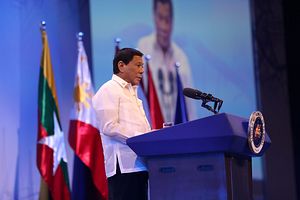This week, as expected, Congress approved Philippine President Rodrigo Duterte’s request to extend martial law in Mindanao. The move is a significant one that has implications for many areas, one of which is the peace process recently terminated with communist rebels, and a proclamation on December 5 declaring the Communist Party (CPP) and the New People’s Army (NPA) as terrorist groups.
In the December 5 proclamation, Duterte said he ended the peace talks because the CPP-NPA “failed to show sincerity” after “it engaged in acts of violence and hostilities, endangering the lives and properties of innocent people.” Several escalatory moves, including threats against these groups as well as the martial law extension this week, have followed briskly since then.
But this also obscures a more complex reality that is often missed amid Duterte’s rants. For instance, a closer look suggests that Duterte’s December 5 proclamation failed to provide additional information as to why his government is designating the CPP-NPA as terrorist groups. Indeed, the only argument it cited was the decision of the United States government in August 2002 to include the CPP-NPA in the list of foreign terrorist organizations.
Officially, the terror tag is yet to be confirmed by a local court, which is required under the law. But Duterte has already directed the Department of Foreign Affairs to publish the designation of the CPP-NPA as a terrorist organization.
As expected, the CPP-NPA reciprocated by denouncing Duterte as a terrorist accused of killing more than 10,000 drug suspects. It described Duterte as a sham socialist who is subservient to the dictates of oligarchs and foreign powers.
But curiously, Vice President Leni Robredo, who belongs to the opposition party, also supports the decision of Duterte to include the CPP-NPA in the list of terrorist groups.
What’s next given all of this?
First and most obviously, it bears noting that it makes it more difficult to restart the peace process when it is the declared policy of the government not to negotiate with terrorists.
Second, and in a broader sense, one thing to watch will be how this impacts other policy areas. There are already indications that the tagging of the CPP-NPA as terrorists is being used as a justification to extend martial law in Mindanao, and possibly in other regions as well. On Wednesday, after Congress had acceded to his request to extend military rule in Mindanao for another year, Duterte said that “all options are on the table” regarding putting the entire Philippines under martial law, sparking even more fears on this front. Whatever the decision of the military, the terror listing of the CPP-NPA is expected to boost the government propaganda about the need to enforce additional security measures.
Third, another area to watch beyond the Philippines is the degree to which foreign military assistance will be deployed in the counterinsurgency operations. Will Duterte authorize greater foreign military aid in the anti-insurgency drive now that the CPP-NPA combatants are already considered terrorists? Duterte’s proclamation, which endorsed the U.S. listing of CPP-NPA as terrorists, could indicate the government’s desire to seek greater U.S. role in the anti-terror campaign.
Fourth, as with several other policy areas in the Duterte administration, the implications of this in terms of the wider fears on rights also bears watching. The use of anti-terror laws to defeat the communists has raised anxieties that this would lead to the widespread violation of civil liberties. Duterte has ordered the “mass arrest of communist leaders” and he added that there will be a crackdown on communist supporters and financiers.
Human rights groups said Duterte’s directives led to a surge of activist killings and intensified military operations in remote communities in the past week.
In this context, it is interesting to note that presidential spokesperson Harry Roque, a former human rights lawyer, was critical of the Human Security Act when it was passed in 2007. He once wrote that the law is “odious to free association,” the absence of a clear definition of terrorism violates due process, and he echoed the statement of the Special Rapporteur by the United Nations Commission on Human Rights who said that many provisions of the Human Security Act are not in accordance with international human rights standards.
Lastly, how all of this factors into Duterte’s overall domestic agenda remains to be seen. The threat of a protracted expanded war with communists could derail Duterte’s push for other priorities that are far from uncontroversial, including federalism and constitutional amendments. Will supporters of the ruling party highlight the current situation to renew the call for the establishment of a so-called “revolutionary government’”with Duterte as the head of this extralegal formation?
Complicating the situation is Duterte’s recent pronouncement that he is still open to negotiating with the CPP-NPA, though this is typical of Duterte who flip-flops on major policy issues. Unless he reverses his two proclamations which ended the peace process and designated the CPP-NPA as terrorists, there is little to hope that the prospect of finally ending Asia’s longest-running insurgency will be achieved under Duterte’s term.
































